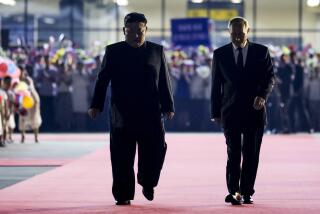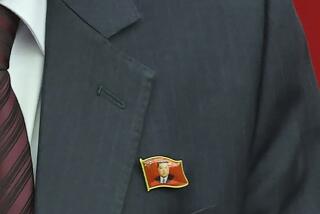Cracks in Kim’s Shell Shed a Bit of Light on Dictator
- Share via
SEOUL — SEOUL -- The birth of North Korean leader Kim Jong Il was heralded by a double rainbow, a bright star and a swallow predicting that the newborn would become a great general and rule the world, according to his official biography.
With a fairy-tale resume like that, it’s understandable that outsiders know less about this leader threatening global order than almost any other ruler on Earth.
Recently, however, a slightly more three-dimensional picture has emerged. With a now-stillborn effort to reach out to other countries, the reclusive Kim had come into more contact with outsiders, providing negotiators with a few more pixels in their bid to envision his next move.
Far from ruling the world with heaven’s blessing, Kim is driven by a deep-seated insecurity, analysts say, as manifested most recently by the Pyongyang regime’s repeated demands that it not be made a U.S. target.
As sometimes seen with those who have an inferiority complex, he finds validation in others’ attention -- no matter how negative.
“I am an object of criticism all over the world,” Kim reportedly told a Russian envoy in 2001. “But since they’re talking about me, I think I’m on the right track.”
Also shading the current standoff with the United States, in tone if not in substance, is Kim’s decision-making style.
In the past, experts frequently wrote Kim off as a spoiled, impetuous despot commanding absolute power over the state. But analysts now say that although Kim has an impatient streak, and his word arguably carries more weight than North Korea’s other 22 million people combined, he consults with key advisors on major issues.
Despite his being treated as a near god by the state media, some observers now say Kim is largely aware of his limitations, making him less likely to do something crazy.
“Kim and those around him are rational,” said Chung Ok Nim, a South Korean commentator and national security advisor. “That doesn’t necessarily mean they’re reasonable.”
Kim was widely pegged as someone who stuttered and could barely construct a coherent thought until the world got a better look during his landmark June 2000 summit in Pyongyang, the North’s capital, with South Korean President Kim Dae Jung.
“We’ve been peeling the mystery away layer by layer,” said Chong Hyun Joon, analyst with Seoul’s Korean Institute for National Unification. “Still, huge gaps remain.”
In fact, Kim is well-informed, cogent and practical, if a bit hung up on how he’s seen abroad and at home, Russian special presidential advisor Konstantin Pulikovsky told Japanese Prime Minister Junichiro Koizumi last Sunday in the Russian Far East.
Pulikovsky escorted Kim across Russia on a nine-day train journey in 2001 during which the two spent three-hour meals discussing politics, the military, music, food and economics. Kim is reportedly afraid of flying.
Kim’s official biography lists his birth date as Feb. 16, 1942, in a log cabin atop Mt. Paekdu, the Korean peninsula’s highest peak. In fact, many scholars believe that the eldest son of North Korea’s founder, Kim Il Sung, was born a year earlier in Russia, with history rewritten to bolster his nationalist credentials and place an even 30-year age gap between him and his father.
Kim saw his younger brother drown in 1948 and his mother die during childbirth in 1949. Those traumas, coupled with the absence of his revolutionary father in his early years, left young Kim facing a lonely childhood with limited emotional grounding, analysts believe.
“There are signs his mother’s loss added to his somewhat impatient personality,” said Jung Chang Hyun, author of several books about Kim Jong Il.
Not Overly Spoiled
Despite his status as the son of the “Great Leader,” analysts say he wasn’t overly spoiled, thanks to a fairly rigorous upbringing by nurses and tutors. In 1960, he entered Kim Il Sung University to study politics.
“I’m not saying he didn’t have any special privileges,” said Lee Hang Koo, a former North Korean reporter who now heads a Seoul-based unification think tank. “But when fellow university students mobilized to help the farmers, he had to do the same, carrying manure on his shoulder and the rest of it.”
After graduation, Kim was quickly promoted to a series of political, propaganda and cultural postings. He showed an interest in arts and film and is said to own 20,000 videos. Along the way, in a system arguably more reminiscent of an old Korean kingdom than a Communist utopia, he elbowed aside his uncle and stepmother to safeguard his path to power.
Kim expounded the virtues of juche, or self-reliance, and oversaw the expansion of his father’s personality cult. This helped secure his future and bolstered his image among first-generation revolutionary leaders.
Working around his shortcomings, including his father’s huge footsteps and his own relative lack of charisma, he shunned the limelight, analysts say, opting instead to play the loyal son as he crushed rivals in the shadows and worked to restructure the system.
Over the years, various colorful stories emerged to fill the information vacuum. The North claims that Kim wrote six “peerless” operas in two years and has a supernatural ability to manipulate time and space, even as the CIA and South Korean intelligence analysts fanned defector tales of a lugubrious, addled playboy serviced by a “pleasure squad” of dancers consuming massive quantities of cognac as they watched animals fight.
Kim has been charged with various acts of state-sponsored terrorism. These include a 1983 bombing in Burma, now Myanmar, that killed 17 South Korean officials, and the 1987 bombing of a South Korean airliner near Burma that killed 115 people.
He’s also been accused of masterminding the abduction of Japanese and other foreign nationals for his nation’s spy and propaganda programs. In 1978, he reportedly ordered the kidnapping of South Korean actress Choi Eun Hee to help improve the North Korean film industry. She was joined voluntarily by her husband, director Shin Sang Ok, until the two escaped in 1986.
By the late 1980s, after nearly two decades of on-the-job training, Kim Jong Il assumed all day-to-day responsibility for running the country.
Pulikovsky, in an account of their trans-Siberian rail journey marked by imported French wines and 15-course meals, says Kim has an analytical mind and widespread interests. But he also surrounds himself with subordinates who refer to him in the third person and bow deeply, awaiting his almost imperceptible signal to stand upright.
Still, there are occasional hints that Kim, who sports bouffant hair and platform shoes, takes the hero worship with a grain of salt. “Mr. Shin, all this is bogus. It’s all just pretense,” a drunken Kim reportedly told the abducted director one evening as a dance troupe jumped and shouted, “Long live our dear Comrade Leader!”
He’s generally seen as ruthless, and fairly uncaring about his people’s plight, although some say accusations of lavish banquets amid widespread North Korean starvation are unfair.
“Just because there’s poverty in America, is it wrong for President Bush to own a ranch and give lavish banquets?” said North Korea expert Jung. “Kim’s a national leader, and most of these are state functions.”
Details of Kim’s immediate family are particularly sparse. “Even top aides who defected don’t know much,” said Kim Young Soo, a professor at Sogang University in Seoul. Sometime in the 1960s, Kim Jong Il reportedly married Hong Il Chon, a fellow university alumnus, and had a daughter before their divorce. He then married Kim Yong Suk, a typist, in 1973, and has several children amid reports of other marriages.
In a rather bizarre incident in May 2001, Kim’s son Kim Jong Nam was caught sneaking into Japan using a forged Dominican passport, claiming that he wanted to visit Tokyo Disneyland.
Lee Young Guk, a former Kim bodyguard now in South Korea, describes an elaborate security system of dummy cars, trains and boats whenever the leader moves domestically, guarded during his rare public appearances by concentric rings of plainclothes security with automatic weapons under their greatcoats.
Kim’s concern over job security can’t be dismissed as mere paranoia, however, analysts say, given the unseating of despotic regimes in Yugoslavia and Afghanistan and the massing of forces around Iraq.
Series of Setbacks
Kim, who’s reportedly Internet savvy, inherited a tough hand with the death of his father in 1994, although it’s one he helped deal. He negotiated his way out of that year’s nuclear crisis, gaining concessions from the international community. But he was quickly hit by a famine that, by some accounts, killed 2 million North Koreans amid continued economic deterioration.
He’s maintained his grip on power but has been hit by a series of setbacks in recent years. Economic reforms announced in 2001 foundered, he apologized for a firefight last year that killed at least four South Korean sailors, and a free economic zone idea along the Chinese border fizzled when China arrested on corruption charges the man Pyongyang had chosen to lead it.
Kim “knows very well that he has to modernize and open up. He watches CNN. The problem between the United States and North Korea is in communicating,” said Kim Yoon Kyu, president of Hyundai Asan, who has met him several times.
The North Korean system credits its leader with all good news and blames others for all setbacks. Still, analysts say, Kim the survivor is badly in need of a win. He’s also a prisoner of the personality cult he helped create, analysts add, given the difficulty of admitting mistakes in a “paradise on Earth” led by an “all-knowing ruler.”
*
Staff writer Barbara Demick in Seoul contributed to this report, along with Chi Jung Nam of The Times’ Seoul Bureau and Alexei V. Kuznetsov of the Moscow Bureau.
More to Read
Sign up for Essential California
The most important California stories and recommendations in your inbox every morning.
You may occasionally receive promotional content from the Los Angeles Times.













